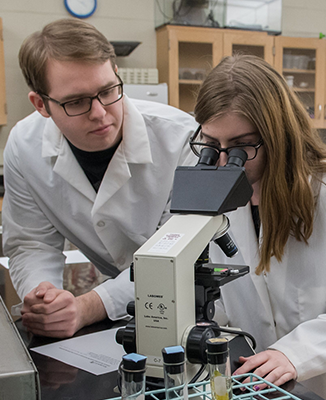Engineering B.S. (Software concentration)
The Bachelor of Science in Engineering with a Software Engineering concentration prepares students in the analysis, design, validation, implementation, and maintenance of computer software systems, where very high reliability is expected even under demanding conditions.
Students learn to conceive and develop high-quality software systems for applications in industry, commerce, engineering, government and research.
With the 4+1 integrated degree program, students can go on to earn an M.S. in Engineering Management with only one additional year of study.
The Bachelor of Science in Engineering is accredited by the Engineering Accreditation Commission of ABET, https://www.abet.org.

Contact Information
Won Joo, Ph.D.
Department Head, Engineering
joo@rmu.edu
412-397-4026 phone
Jameela Al-Jaroodi, Ph.D.
Coordinator, Software Engineering
aljaroodi@rmu.edu
412-397-4053 phone
- 4-Year Course Plan
-
Freshman Year, Fall
- Intro to Engineering
- Calculus w/Analytic Geometry I
- Chemistry I with lab
- Humanities: Art & Music
- Intercultural Communications/Reading & Writing Strategies
Freshman Year, Spring
- Contemporary Social Problems or similar
- Programming
- Calculus w/Analytic Geometry II
- General Physics I with lab
- Argument & Research
Sophomore Year, Fall
- Advanced Programming
- General Physics II with lab
- Data Structures & Algorithms for Engineers
- Discrete Mathematics
- Public Speaking & Persuasion
Sophomore Year, Spring
- Engineering Statistics
- Fundamentals of Software Engineering
- Computer Architecture for Software Engineers
- Circuits & Electromagnetics
- Fundamentals of Accounting or similar
Junior Year, Fall
- Prototyping & Interface Design
- Operations Research I or similar
- Advanced Programming
- Survey of Economics
- Professional Communication in Workplace
Junior Year, Spring
- Database Management System
- Software Verification/Validation
- Management Theory & Practice
- Linear Algebra w/ Applications
- Software Design & Construction
Senior Year, Fall
- Engineering Practice
- Distributed Systems Implementation
- Software Engineering Elective
- Value Design
- Reading Literature: Coming of Age or similar
Senior Year, Spring
- Integrated Engineering Design
- Principles of Marketing
- Software Engineering Elective
- General Psychology
- U.S. History I or similar
- Additional Program Details
-
Program Educational Objectives
Five years after graduation, RMU engineering graduates should:
- Be technically competent engineers.
- Be hands-on practitioners of engineering.
- Possess strong understanding of business and, strong team and communications skills.
- Be well-prepared to embrace the continuous learning necessary to practice engineering over their entire professional lifetimes.
- Have a strong understanding of engineering ethics.
Student Outcomes
Until 2018-2019 Academic year.
At the time of graduation, the graduate should have:
- an ability to apply knowledge of mathematics, science, and engineering.
- an ability to design and conduct experiments, as well as to analyze and interpret data.
- an ability to design a system, component, or process to meet desired needs within realistic constraints such as economic, environmental, social, political, ethical, health and safety, manufacturability, and sustainability.
- an ability to function on multi-disciplinary teams.
- an ability to identify, formulate, and solve engineering problems.
- an understanding of professional and ethical responsibility.
- an ability to communicate effectively.
- the broad education necessary to understand the impact of engineering solutions in a global, economic, environmental, and societal context.
- recognition of the need for, and an ability to engage in life-long learning.
- knowledge of contemporary issues.
- an ability to use the techniques, skills, and modern engineering tools necessary for engineering practice.
From 2019-2020 Academic Year to Present
At the time of graduation, the graduate should have:
- an ability to identify, formulate, and solve complex engineering problems by applying principles of engineering, science, and mathematics
- an ability to apply engineering design to produce solutions that meet specified needs with consideration of public health, safety, and welfare, as well as global, cultural, social, environmental, and economic factors
- an ability to communicate effectively with a range of audiences
- an ability to recognize ethical and professional responsibilities in engineering situations and make informed judgments, which must consider the impact of engineering solutions in global, economic, environmental, and societal contexts
- an ability to function effectively on a team whose members together provide leadership, create a collaborative and inclusive environment, establish goals, plan tasks, and meet objectives
- an ability to develop and conduct appropriate experimentation, analyze and interpret data, and use engineering judgment to draw conclusions
- an ability to acquire and apply new knowledge as needed, using appropriate learning strategies
Enrollment and Graduation Data (B.S. Engineering)
- 2022-2023: 57 new admission, 225 enrolled, 62 graduated
- 2021-2022: 56 new admission, 248 enrolled, 63 graduated
- 2020-2021: 42 new admission, 275 enrolled, 74 graduated
- 2019-2020: 78 new admission, 318 enrolled, 87 graduated
- 2018-2019: 80 new admission, 349 enrolled, 99 graduated
- 2017-2018: 94 new admission, 359 enrolled, 149 graduated
- 2016-2017: 102 new admission, 532 enrolled, 138 graduated
Sample Courses:
These are some of the classes for students in this academic program:
Top Employers

Call us at:
1-800-762-0097
School of Engineering and Science
The School of Engineering and Science offers robust programs that prepare students for innovative careers in engineering and science.
Visit School Site
